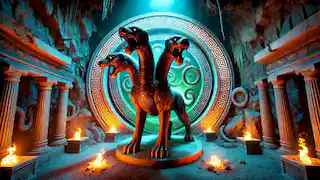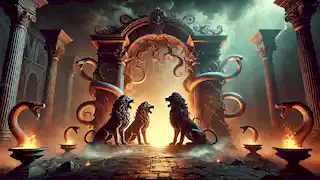In the heart of ancient Greece, where myth and reality intertwined, there was a land steeped in stories of gods, monsters, and mortal heroes. Among these legends stood the tale of Cerberus, the three-headed guardian of the Underworld. This creature was as much a symbol of Hades' dominion as it was of the thin line separating the world of the living from the world of the dead. This is the story of the Cerberus, his origins, his role in the grand tapestry of Greek mythology, and his encounters with mortals and immortals alike. Long before humanity rose to prominence, when titans and gods warred over dominion of the cosmos, there were beings forged in the chaos of creation. Among them was Typhon, a towering monster whose strength rivaled the gods themselves, and Echidna, the mother of monsters. Together, they gave birth to a lineage of creatures destined to haunt mortal and immortal alike. Cerberus, their offspring, was unlike any other. With three canine heads, a serpent for a tail, and a mane of writhing snakes, he was a formidable sight to behold. From the moment of his birth, he was destined for a purpose beyond mere monstrosity. Hades, god of the Underworld, saw in Cerberus the ideal guardian for the gates of his realm—a creature capable of ensuring that no soul escaped and no living being intruded. Cerberus's lair was at the threshold of the Underworld, where the River Styx flowed and the mournful cries of lost souls filled the air. This was not a place for the faint of heart, and it was Cerberus’s duty to ensure that the natural order was preserved. His three heads were not merely a testament to his strength but a representation of his vigilance. Each head was said to see into a different realm: one into the past, one into the present, and one into the future. This made him an unparalleled sentinel. The gods of Olympus respected Cerberus’s role, though they often shunned the Underworld itself. Mortals, however, whispered of him in fear. Tales spread of his thunderous growls that echoed across the Styx, his fiery eyes that glowed like the embers of Tartarus, and his fangs, which could crush the strongest armor. One of the most famous encounters with Cerberus came during the Twelve Labors of Heracles. The hero, tasked with capturing the beast alive, knew this would be no ordinary feat. Heracles ventured into the depths of the Underworld, armed not with weapons but with his courage and divine favor. Hades, intrigued by Heracles’ audacity, permitted him to attempt the feat, on the condition that he did not harm Cerberus. Heracles approached the guardian with caution, avoiding the serpent tail and maneuvering past the snapping heads. With a feat of strength and determination, he wrestled Cerberus into submission, wrapping his powerful arms around the beast and dragging him to the surface. The people of Greece were astonished to see Cerberus, the terror of the Underworld, subdued. Yet Heracles, true to his word, returned the beast unharmed to Hades, earning the god’s respect. While many feared Cerberus as a harbinger of death, he also played a role in maintaining the balance between life and the afterlife. Without him, the souls of the dead could roam the Earth unchecked, creating chaos. He was both protector and punisher, a creature who embodied the duality of existence. Cerberus was also a symbol of loyalty. Bound to Hades, he never abandoned his post, no matter the challenges. This steadfastness made him a figure of awe even among the gods, who often lacked such unwavering dedication. {{{_02}}} Though Heracles' labor is the most well-known tale involving Cerberus, there were others who encountered the beast. Orpheus, the legendary musician, used his lyre to lull Cerberus to sleep as he sought to retrieve his beloved Eurydice from the Underworld. The sound of Orpheus’s music was said to momentarily soothe the beast's eternal vigilance, a testament to the power of art even in the face of monstrosity. Another tale tells of Psyche, who, on her journey to earn back the love of Eros, faced Cerberus. She fed him honeyed cakes, a gift from the gods, which allowed her safe passage into the realm of Hades. The legend of Cerberus has endured through the centuries, evolving with each retelling. He has become a symbol of boundaries, both physical and metaphysical. Cerberus reminds us of the inevitability of death and the importance of respecting the natural order. In art and literature, Cerberus is often depicted as a fearsome guardian but also as a tragic figure, bound to a duty he cannot abandon. His story resonates as a cautionary tale about the burdens of responsibility and the strength required to fulfill one's purpose. {{{_03}}} As a creature born of chaos and entrusted with the preservation of balance, Cerberus is a paradoxical figure. He is terrifying yet loyal, monstrous yet necessary. His presence in Greek mythology serves to remind us of the complexities of life and death, and the forces that govern both. In the modern world, Cerberus continues to inspire. From his role in epic poetry to his appearances in contemporary fantasy and art, he remains a compelling figure. The story of Cerberus, though rooted in ancient Greece, transcends time, offering lessons on duty, strength, and the eternal interplay between light and darkness. {{{_04}}} The tale of Cerberus is one of power, loyalty, and the delicate balance of the universe. As the eternal guardian of the Underworld, he embodies the weight of responsibility and the eternal vigilance required to maintain order. Through his story, we are reminded of the mysteries of life and death and the legends that keep those mysteries alive.The Origins of Cerberus
The Guardian of the Underworld

Cerberus and Heracles
The Dual Nature of Cerberus
Myths Beyond Heracles
Cerberus in Modern Memory
Reflections on Cerberus
Conclusion
The Story of the Cerberus
Reading Time: 5 min

About Story: The Story of the Cerberus is a Myth Stories from greece set in the Ancient Stories. This Descriptive Stories tale explores themes of Perseverance Stories and is suitable for All Ages Stories. It offers Cultural Stories insights. The legendary three-headed guardian of the Underworld who bridges the worlds of the living and the dead.
















